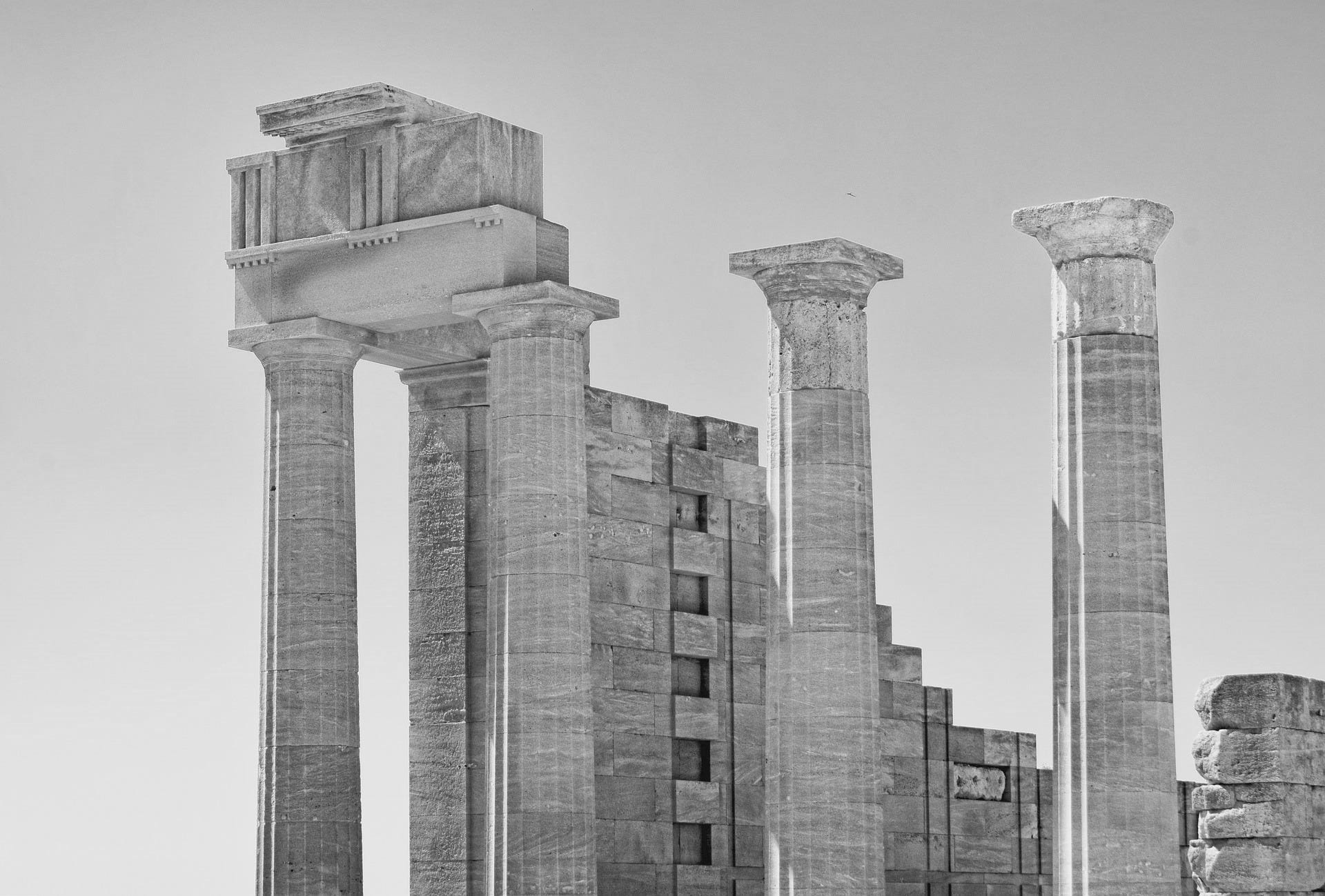Capitalist realism and the end of history
Change has become utopian and the status quo uncontested. On the philosophy of capitalist dystopia and resistance to a system that cannot be improved or changed but only dismantled.
We live in a world that has stopped in time.
History has come to an end; change has been rendered impossible — banished to the realm of the ridiculous and the métier of naive utopians. Capitalism presents itself as the solution to, well, everything. It has conquered the present, shapes the future, and gradually reconstructs the past to present itself as the logical culmination of human development — as if there were such a thing. There is but one system, one ideology, one philosophy: the capitalist one.
If you cannot be monetized, you have no value. If you have no value, you do not deserve to live. No, you cannot escape. Everything is dead.
‘It’s easier to imagine an end to the world than an end to capitalism.’
Frederic Jameson, Slavoj Žižek
Anti-capitalist capitalism and peaceful resistance as conformity
Some anti-establishment struggles have become entwined with capitalism, strengthening rather than eroding it.
Extinction Rebellion, Fridays for Future, Just Stop Oil, and similar movements serve mainly as a platform for privileged white people to justify their capitalist lifestyles to themselves. “I’m doing something at least. I’m trying,” they seem to scream as they block roads, drawing the anger of the very working-class people they are trying to convince, or arrange pre-approved and police-sanctioned protests. Extinction Rebellion, in particular, have been known to actively collaborate with law enforcement, on occasion applauding their oppressors and the system they supposedly reject, actively seeking to be arrested, and even taking pride in it.
Most climate activists do not want to fight the system; they want to change and bend it to reason. But there is no reasoning with a self-enforcing, self-developing, adapting, all-encompassing, uncaring ideology. Those who have the power to effect genuine and lasting change will never do so of their own volition. And they certainly will not be convinced by a few peacefully protesting single-issue activists.
Green capitalism and rainbow capitalism are proof of the system’s incredible, self-directed adaptability. Hope and morality have been turned into products to be sold for profit. Climate change itself has become an industry, built on privileged activism and good consciences. Replacing oil and coal industries with ‘sustainable’ industries, themselves built on the exploitation of labor and the mining of rare-earth elements, but never questioning the existence of industry itself. Never questioning the price of cost-efficiency and endless growth on a finite planet.
Even direct anti-capitalism has been largely disseminated within capitalism, has become part of the dogma. In Cyberpunk fiction mega-corporations are portrayed as an evil that must be avoided; uncountable TV shows and movies present us business executives as soulless, egotistic, and greedy psychopaths.
The Big Short, a film about the 2007–2008 financial crisis starring Christian Bale, Ryan Gosling, Steve Carell, and Brad Pitt, grossed $133 million on a $50 million budget. For a few hours, it made us feel outraged. Outraged as we sipped our coke and ate our popcorn, the cinema ticket paid. The Wolf of Wall Street inspired a generation of would-be neoliberals, giving them hope that, yes, they too, could become part of the elite. Become rich, do drugs, party, and have sex with everything that walks. The cynical character of the movie lost on a generation of disenfranchised youth, eager to hop on anything and everything that could help them escape the status quo. Be it the stock market, entrepreneurship, hustle culture, techno-hopium, or something else promising salvation. In the end, it all serves to further entrench and justify capitalism. If you cannot change them, try to become one of them.
The point here is not to condemn such behavior or belittle the laudable efforts of environmental activists. No, the point is to argue that there is no such thing as escaping capitalism or changing it for the better.
To fight the ruling order — to really hurt it — peaceful protests and small-scale disruptions just will not cut it. More is needed. Nothing will change without class consciousness, international solidarity, the establishment of alternate institutions (such as mutual aid networks), and, when it comes down to it, violent revolution. (The philosophy and morality of violence is naturally a highly complex matter far beyond the scale of this essay. Suffice it to say at this point that we have been conditioned to regard violence as something inherently evil, something that must be avoided at all costs — except, of course, when it is committed by the state monopoly to either quench anti-systemic tendencies at home or exploit and ruin other nations. Is it evil to fight a system, with all means necessary, that is trying to take even the last of your meager remaining freedoms? Is stealing bread illegal?)
Capitalism is not an economic system; it’s a way of living, a way of seeing things, a way of interpreting the world, of assigning a value to everything. It’s an ideology — quite possibly the most powerful ever devised. Part of its strength stems from the fact that capitalism does not have to be maintained. It maintains itself, changing only when profitable. The wealthy elite, the upper one percent, are not guardians of this system; they are merely manifestations of it. I talk about this in more depth here.
Post-ideology and constant propaganda
Fascism requires constant propaganda; it requires devotion, a suspension of morality, and some sort of spiritual agenda — the inherent superiority of one race over others, genetic purity, the shifting of blame, and a grand future for all who are willing to become part of the machinery. Capitalism, on the other hand, does not require anything of the sort. It constantly reinforces its own existence. By default, one is part of the machine, no conscious effort required — on the contrary: the less you think, the higher you will rise. In fact, capitalism thrives perfectly well, if not better, in the absence of any sort of belief system. Apathy as a requirement:
Capitalism appears a sort of post-ideological framework. It has rendered all other ideologies obsolete and transformed them into something to be avoided at all costs — something evil. With the fall of the Soviet Union, the last alternative has fallen, and capitalism has since reigned supreme, free to dismiss all apparency of choice.
We keep telling ourselves that, yes, while capitalism is not perfect, it’s still the best option. It could be so much worse, right? We could be living in an authoritarian dictatorship or, worse, in a communist system (oh, the horror!). By portraying all alternatives as either malicious (socialism, communism) or utopian and naive (anarchism) capitalism established itself as the default status. Not just one of the options, but the only one. In the process, the word itself lost all meaning. The most propagandized of all, of course, are Americans. They must be, or else their system would have fallen apart a long time ago.
Capitalist ideology now primarily takes the form of harsh cynicism, as Slavoj Žižek, a Slovenian philosopher and cultural theorist, writes. It mocks the very concept of ideology while structuring our social reality to unprecedented degrees. In this way, beliefs and values have given way to cynical distance and a troubling level of apathy.
Yes, capitalism is bad, yes, inequality is worse than ever, yes, our lives are spent toiling for basic necessities and the profit of others, yes, we have estranged ourselves from one another and lost touch with nature, yes, poverty and hunger are more widespread than ever, yes, our ecosystems are failing and we are on the brink of collapse, but, hey, at least we aren’t communists. It could be worse, right? Imagine living in North Korea or China or Iran, oh boy. In this way, radical cynicism emerged as the dominant post-ideological ideology — the end point of all development. No more questions to be asked.
‘Both Hegel and Marx believed that the evolution of human societies was not open-ended but would end when mankind had achieved a form of society that satisfied its deepest and most fundamental longings. Both thinkers thus posited an “end of history”: for Hegel this was the liberal state, while for Marx it was a communist society. This did not mean that the natural cycle of birth, life, and death would end, that important events would no longer happen, or that newspapers reporting them would cease to be published. It meant, rather, that there would be no further progress in the development of underlying principles and institutions, because all of the really big questions had been settled.’
Francis Fukuyama
Moral absolution, delegation of responsibility, and ideological blackmail
As mentioned, anti-capitalism has become a useful component of capitalism. The Austrian philosopher Robert Pfaller coined the term ‘interpassivity’ to describe a phenomenon that most of us are intimately familiar with: our anti-capitalism is now performed for us by others.
We push our moral obligations away by watching anti-capitalist movies, documentaries, and TV shows, or reading certain books. From our homely comforts, we observe activists and pseudo-progressive politicians as they ‘try to make the world a better place.’ It all makes us feel better about ourselves and allows us to continue consuming; it absolves us of our crimes, delegating our responsibilities. Consuming and observing anti-capitalism as a means of enforcing the current order.
The inner subjective attitude, as Žižek explains, has taken the place of exhibited and externalized behavior. As long as we believe in our hearts that capitalism is bad; as long as we consume anti-capitalist media, buy fair trade products and attend peaceful protests, we can keep on participating. It’s a form of cognitive dissonance, a kind of self-deception. The ironic distance and the apathy — to money, wealth, the stock market, the rich, politics — a coping mechanism that allows us to live with the status quo and the suffering all around us. Even our own.
Corporate anti-capitalism has become virtually indistinguishable from ‘true’ anti-capitalism. Protests, demonstrations, the aid industry, and activism have faded into the background noise of the capitalist machine, making demands they do not expect to be met, offering no valid alternatives to the status quo. Instead of providing hope, instead of establishing alternative institutions and processes, instead of undermining the current system and illuminating a pathway out, liberal activists channel their energies into undirected resentment. The provision of real alternatives is left to ‘radicals,’ primarily anarchists and those on their side, who receive little to no media attention, publicity, or support from the public — on the contrary. It’s easy to detest capitalism, is what I want to say; it’s far more difficult to create something better.
To project our dissatisfaction with the current state of affairs onto billionaires and the political elite seems straightforward, but, in the end, it’s our complicity that allows them to reign and impoverish others. Capitalism is a highly abstract concept, an illusion that would be meaningless without our cooperation. Money, the most powerful motivator of all, loses all sense of value as soon as we stop assigning it any.
In this sense, even corporate and political elites serve an important purpose for capitalism. They allow us to direct our rage at them without actually causing any meaningful harm. In this way, the abstract system finds itself a scapegoat and provides further moral relief to the masses. At least we’re not as bad as those hoarding billionaires, right?
In his book Capitalist Realism, Mark Fisher describes the harmful aid industry and the myths of development and progress as a form of ideological blackmail. It maintains that individuals — we — are to blame for poverty and hunger in the Global South, and that if we gave a little more, helped a little more, we could finally put an end to these blights upon humanity. We just aren’t doing capitalism the right way. By buying the right products, consuming in a socially conscious manner, and making others aware of the issue, we could alleviate the incredible suffering. And if we can’t, well, then it’s their own fault — the fault of their corrupt leaders and their failing institutions. The horrors and atrocities of colonialism, slavery, and neoliberal plunder banned to the safety of academic history books and the unheard lamentations of leftist thinkers.
With discussions rattling at the foundations of the post-ideological ideology rendered laughable, naive, utopian, or the product of misdirected anger from young disillusioned idealists, we have finally arrived at the end of history and all change. The foundations in place, the only thing left to do is find out how high the skyscrapers can go and if there is an end to them. Infinity out of the finite now not a contradiction but a goal.
Let it all collapse. Hell, help along if you can.
I’m author, writer, and activist Antonio Melonio, the creator of Beneath the Pavement. If you enjoyed this piece, please consider becoming a paid subscriber here on Substack or over on Patreon. It’s the best way to support Beneath the Pavement and help me put out more and higher-quality content.
If monthly contributions are not your thing (I understand), you can also leave me a tip or some coffee money over on PayPal. Thank you.





